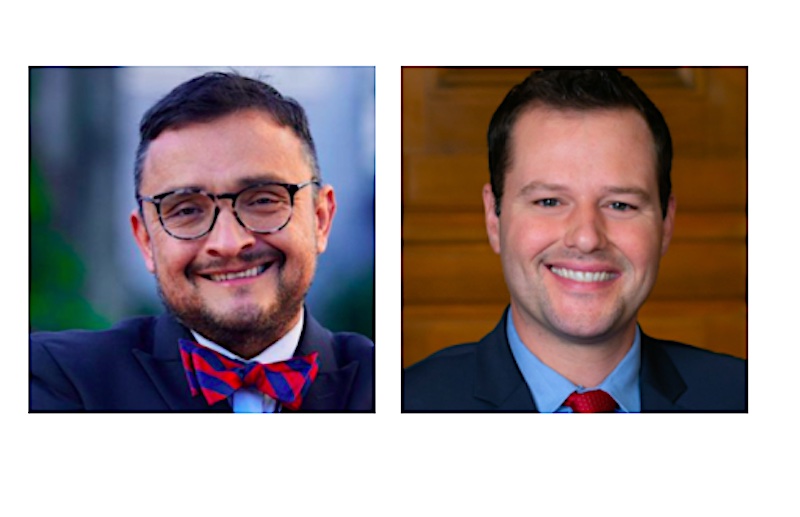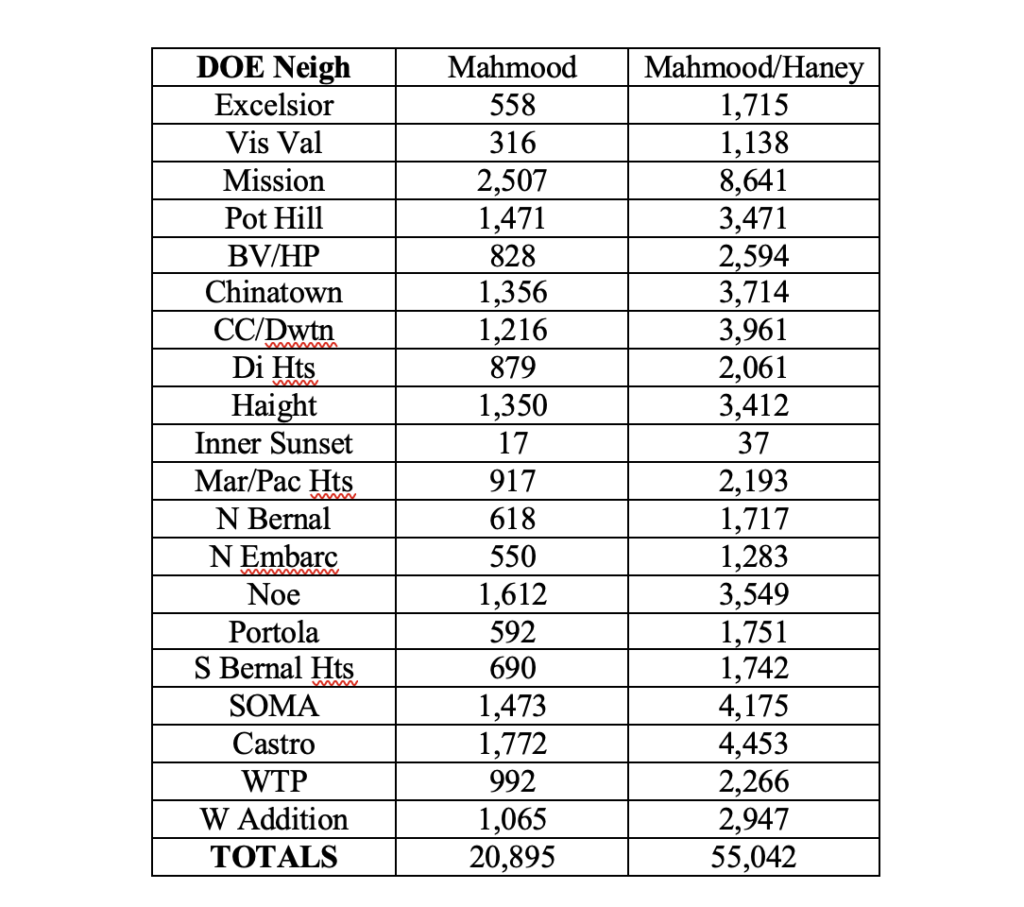“Trust me, it doesn’t matter how enticing your idea sounds. If you don’t have the funds to pay for people’s talent, no one is going to come on board. Money talks, and bullshit walks.”
—Philadelphia Congressman Michael “Ozzy” Myers, on a FBI bug as he received a $50,000 bribe from an FBI agent, 1979
Let’s start by full disclosure: I voted for David Campos and made a small donation to his campaign. However, I can read elections results and more importantly, I can count votes, both of which are fact based and independent of political preferences.
What the numbers show is the reason for the Campos campaign loss was the inability of Campos and his allies to inspire voters who had voted for him in February to come out again in April.

He lost not because of the compelling argument of the Yimby “movement” (as the numbers below will clearly indicate) but in the inability of a center-left campaign to overcome a well-funded negative campaign with a balanced and effective effort that motivated his base to vote at all.
Unless the center-left candidates can learn from the Campos campaign mistakes we are looking at the fourth elected official being recalled and a total sweep by deeply conservative dark money forces in a single calendar year. One would have to go back to 1975 with the election sweep of left-liberals George Moscone for Mayor, Dick Hongisto for Sheriff and Joe Freitas for District Attorney for a similar lop-sided single year election result.
The post-election spin is that, in the construction of Congressman Myers deathless formulation quoted above, the “bullshit” of the Yimby narrative is being transformed before our very eyes into the “talk” that money buys. The Chronicle, in near orgasmic overreach, has characterized Tuesdays election as not “just a win for the Yimby movement—it was a coup d’etat,” a curious description for an election in which a serving office holder, supported by a serving mayor—representatives of the “state”— defeats a non-office holder.
But that is not what the preliminary numbers of Tuesday election show when compared to the March primary. Both candidates under preformed and what the real preference of the voter in the 17 Assembly District appears to be is none-of-the-above, or “I don’t care,” as fewer than a third of the voters even bothered to show up.
The Vote: February to April
According to the Department of Elections, there were as of last week some 19,000 votes still to be counted, all but 2,700 cast on Election Day as of election night. These late absentees and some 400 provisionals usually break progressive, but assuming they break the same way as the votes already counted that would mean an additional 12,000 votes for Haney and 7,000 votes for Campos.
Total turnout would be some 81,000 or 30 percent of the voters in the 17th AD. That’s down from the 93,778 votes cast in the 17th AD in March (32 percent of the registered voters).
April’s showing was even more dismal in that between March and April there were some 19,000 fewer registered voters in the district—287,636 in February and 268,722 in April! It truly is “bullshit walking” to argue that Haney’s victory, with an estimated 18 percent of the registered voters of the 17th AD, represents anything other than a victory of massive campaign spending.
February April Vote Compared by DOE Neighborhood
| DOE Neigh | Campos Feb | Campos Apr | Haney Mar | Haney Apr |
| Excelsior | 1,352 | 928 | 1,157 | 1,072 |
| Vis Val | 633 | 402 | 822 | 724 |
| Mission | 5,506 | 3,447 | 4,091 | 4,550 |
| Pot Hill | 1,638 | 1,062 | 2,000 | 2,473 |
| BV/HP | 1,653 | 1,149 | 1,766 | 1,610 |
| Chinatown | 1,549 | 1,177 | 2,349 | 2,660 |
| CC/Dwtn | 2,120 | 1,786 | 2,745 | 3,145 |
| Di Hts | 1,101 | 742 | 1,182 | 1,426 |
| Haight | 2,073 | 1,403 | 2,062 | 2,544 |
| Inner Sunset | 18 | 14 | 20 | 25 |
| Mar/Pac Hts | 965 | 702 | 1,276 | 1,683 |
| N Bernal | 1,595 | 940 | 1,099 | 1,178 |
| N Embarc | 572 | 417 | 733 | 937 |
| Noe | 2,113 | 1,398 | 1,937 | 2,502 |
| Portola | 1,149 | 763 | 1,159 | 1,104 |
| S Bernal Hts | 1,492 | 919 | 1,052 | 1,154 |
| SOMA | 1,600 | 1,277 | 2,702 | 3,143 |
| Castro | 2,971 | 1,905 | 2,681 | 3,207 |
| WTP | 1,085 | 750 | 1,274 | 1,441 |
| W Addition | 2,085 | 1,339 | 1,882 | 2,251 |
| TOTALS | 33,448 | 22,567* | 34,147 | 38,916* |
* as of 20 April DOE Count 3 with 19,000 votes to be counted
What leaps out is the startling decline of the Campos vote in ALL of the Department of Elections neighborhoods. Even adding some 7,000 of the uncounted votes to Campos would see him still earn fewer votes in April than in February. Equally noteworthy is Haney’s decline in working class and BIPOC neighborhoods in the southeast portion of the district- Excelsior, Bayview Hunters Point and Vis Valley.
But Haney’s poor showing (and the Yimbys) is made clear when one looks at the Yimby candidate in February, the Bilal Mahmood vote. If the Haney victory was such a massive win for the Yimbys it would have built on Mahmood’s vote, basically combining the February vote of both. Here is what it would look like.
“Potential Yimby” Vote; Mahmood and Combined Haney/Mahmood February Vote

Haney’s actual vote in April fell short in every neighborhood when compared to the “potential Yimby” vote shown above and not by a little, but a lot, as can be seen in comparing the last column of both charts. His final vote will be less than the combined Yimby vote from February.
As the actual votes show both candidates under-performed and of the two, the Haney underperformance occurred even when he and his real estate backers massively outspent Campos and had the additional benefit of a constant drumbeat of stories about how the Yimby housing issues were the defining issues of the campaign.
Even with all that, Haney failed to consolidate the Yimby vote. His embrace of negative campaigning cost him votes, causing him to run a far closer race than otherwise. Had the Campos campaign made fewer mistakes, the impact of the drumbeat of negative campaigning might have reduced.
Lesson Learned
The Campos campaign was conceived around a theme—no corporate contributions—that has no constituency in his district. San Francisco bans corporate campaign donations to local campaigns, and local voters simply don’t see it as a major issue. While it might make sense at the state level where direct corporate donations are allowed it made no political sense in San Francisco.
Failing to make headway with its defining theme, the campaign then decided to attack Haney for the drug problem in the Tenderloin, from the right, calling Haney lax on fighting drug dealing in his district. This smacked of desperation and was unworthy of the record of Campos and produced a major backlash in his base. How many folks walked away from voting in what was an already extremely negative campaign is unknown, but it hurt his efforts in his base. He paid the price, not his high-level (and well-paid) campaign strategist.
But for many it was his silence on his housing record as a supervisor that was most inexplicable. Haney wanted to make housing the defining issues in the campaign — and Supervisor Campos was on the right side of a score of housing issues in his eight years on the board, from limiting tenants in common conversions of rent-controlled apartments into pricey condos to returning some 10,000 AirBnB units back to rentals. Saving housing, and preserving existing affordable housing for low-and-moderate income San Franciscans, is the most pressing housing issue in the city, and David Campos was often leading that fight saving the homes, literally, of thousands of San Franciscans. That’s why the real estate industry and the Yimbys came after him with such full force.
They want the people Campos kept in San Francisco out of the city so that they can constantly churn the housing stock for profit. That he never pushed or promoted the meaning of his record on housing is simply beyond understanding.
But finally, his campaign simply could not recover from the tens of thousands of dollars spent by independent committees that pounded him and his record with lies and repeated negative mailings and messages. Negative campaigns work because they turn people away from voting, feeding the cynicism that supports the status quo and established power that’s why they are used by conservatives far more than left liberals. This campaign was so toxic that it reduced even Haney’s support, turning Haney supporters off as well, as the numbers cited above show.
Negative campaigns can only be defeated with a campaign of hope, based upon clearly articulated issues that come from the people, that call upon the best of people, that unite people and that show how government can work for real people, not just the rich and powerful.
Future campaigns must be clear on who their supporters are and spend their time and money talking to them. They must engage in public campaigning, on street corners, parks and shopping districts, it must be seen, and it must put people in motion. They must register voters and then get those new voters out to vote. It cannot stand by and see the electorate constantly reduced by cynicism and manipulation.
Left-liberals must expand beyond their usual base of young political activists to include as many San Franciscans as possible. The old slogan of “unite with the many to oppose the few” has never been more true. The issue is democracy—and the assault on it by a moneyed elite seeking near total control over local government.
Explain why there are people and interests that want to limit free and fair elections in San Francisco (HINT: they want you out of here!) That’s why there is gerrymandering of the districts for supervisors, that’s why the mayor continues to rely on emergency powers that always restrict poor people and rewards business people.
Land use is at the heart of San Francisco politics. The real estate/developer axis has changed from one dominated by various local players to one dominated by national and international players. Development, especially residential development has been financialized and made part of the international flow of capital. More than a third of hosing transactions are all now cash-based, often with buyers being hedge funds. They are buying real estate, not “homes” and they want total control over development policy so they can demolish existing homes and build expensive “housing.”
The seek the transformation from local control to centralized state control so that it is easier to manipulate and control. That can only be done by diminishing the political power of current residents.
Second, left/liberal candidates must build democracy by building into their campaign voter registration drives, literally expanding democracy by launching visible “Register to Save San Francisco” campaigns with great street visibility in every neighborhood.
Third, they need to build a real ground-campaign capacity with activities and events aimed brining people together, first in their neighborhoods and then into the campaign. Neighbor to neighbor “truth campaigners” can be organized to talk to folks about the latest lie being sold by the other side.
And above all, keep the campaign positive, hopeful AND hard hitting.





